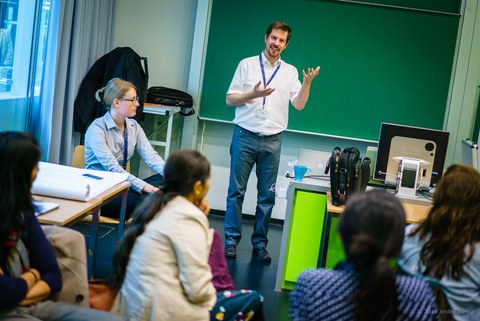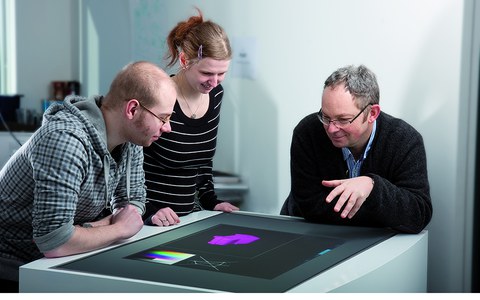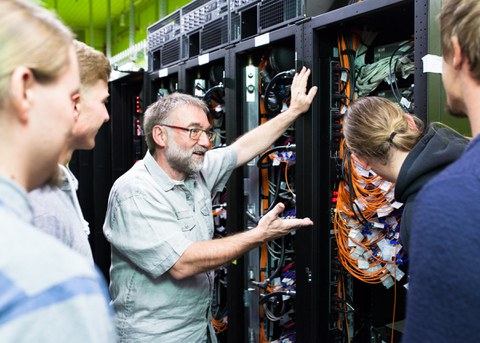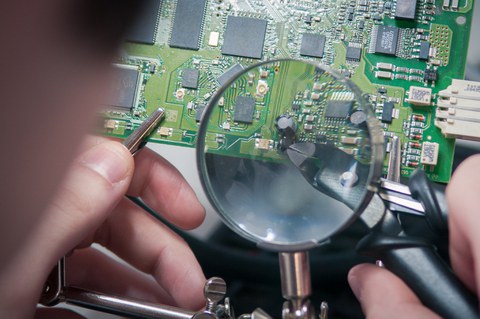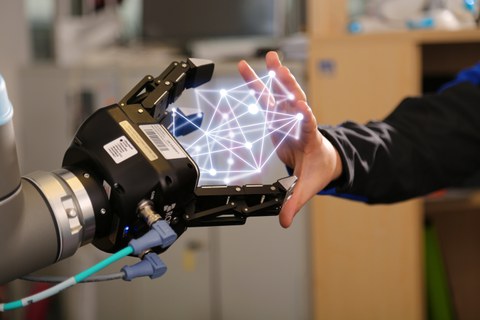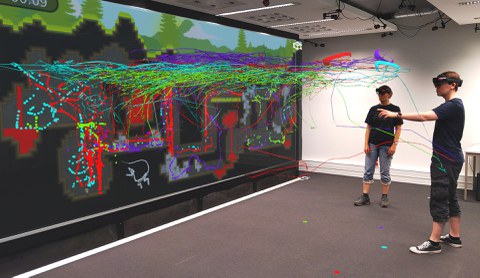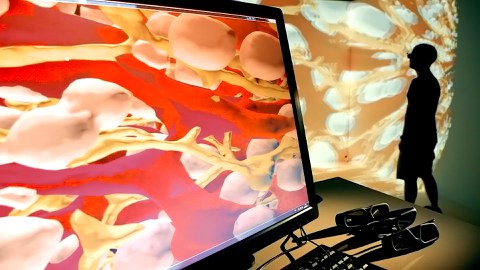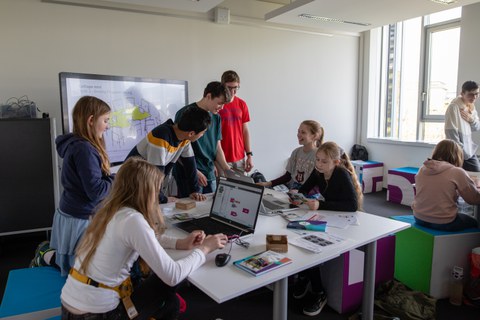DEGREE PROGRAMMES
Table of contents
- A quick overview of all our degree programs
- Study Computer Science in Dresden
- Bachelor Computer Science
- Bachelor of Applied Computer Science
- Diploma in Computer Science
- Diploma in Information Systems Engineering
- Master Computer Science
- Master's in Media Computer Science
- Master's in Computational Modeling and Simulation
- Teacher training in computer science
A quick overview of all our degree programs
can be found here.
Study Computer Science in Dresden
Welcome to one of the most diverse and attractive places to study in Germany. We offer you nine study programs with current focal points at a research-strong university of excellence that enable you to go your own way. © TU Dresden, Faculty of Computer Science
Bachelor Computer Science
Computer science is everywhere: learning machines, autonomous cars, apps for everyday life - life is becoming digital, and computer science is the key to this.
Analyzing huge amounts of data helps with researching life or predicting the climate, virtual worlds simulate realities and future scenarios, robots support work. Almost every household appliance is programmable today. Computer science creates the conditions for this. In this lively and versatile scientific discipline, everything revolves around digital information, its systematic processing, storage and transmission.
The Bachelor of Computer Science provides you with a broad-based education in the scientific foundations of computer science.
Bachelor of Applied Computer Science
The Bachelor's degree course in Applied Computer Science combines mathematical and computer science fundamentals with an introduction to modern computer science topics. As a hybrid subject, Media Computer Science combines the best of both worlds. As a link between people and machines, it combines computer science and design to make digital systems optimally usable for people. Media Computer Scientists create interactive user interfaces that make operating devices and systems easy and pleasant.
The Bachelor's degree program in Applied Computer Science therefore offers a broad-based education in the scientific foundations of computer science. It also imparts knowledge of design aspects, multimedia technologies and applications.
The acquired knowledge is consolidated in a variety of practical tasks. Numerous computer workstations with extensive equipment and special laboratories equipped with high-end visualization technology, 3D mixed reality technologies, motion tracking technology or modern audio and video editing technology are available for this purpose.
Diploma in Computer Science
Technologies such as data analytics, robotics, machine learning and computer vision are shaping our future. A modern, high-performance IT infrastructure is a must for every company today, and software can be found in almost every device - from washing machines to autonomous vehicles.
IT creates the conditions for digital transformation. It seeks suitable structures and methods to develop complex and intelligent systems and design them efficiently and securely.
The integrated degree course includes a six-month work placement, preferably abroad. In addition, other subject areas from the wide range of courses offered by the full university can be taken as a minor subject, thus opening up new areas of knowledge for interdisciplinary work.
Diploma in Information Systems Engineering
Hardware meets software - Information Systems Engineering is the combination of electrical engineering and computer science. Thanks to this combination (= embedded systems), more and more functions that used to be performed by hardware can now be realized by microprocessors and software. These embedded systems are now used in all areas of modern technology. Why? They help to save energy, improve comfort and reliability and reduce the risk of accidents. In addition, the use of embedded systems makes further new functions possible. In order to design and develop these systems, you need engineering knowledge as well as software skills. This is why the degree program in Information Systems Engineering is run jointly by the Faculties of Computer Science and Electrical and Computer Engineering.
Master Computer Science
The aim of the English-language Master's degree course in Computer Science is to prepare you for the diverse challenges of the dynamically developing discipline of computer science. In addition to the broad basic knowledge, you will acquire specializations in various areas of specialization and will be ready for a research-oriented academic career or a demanding, application-oriented industrial career. In addition, you will acquire general skills - language skills, research skills, subject-specific presentation techniques and practical skills as part of the module "Research and Development in Computer Science".
Master's in Media Computer Science
The Master's degree program in Media Computer Science provides you with knowledge in the areas of media technology, media production and media didactics, which you can use to investigate and optimize the interaction between people and computer systems. The focus is on the design of multimedia applications and systems in research and development.
Your future integrative and interdisciplinary projects will range from adaptive web applications to learning environments and computer games.
The degree program is strongly research-oriented. Here you will learn to implement multimedia communication and information systems and the necessary design methods. You can use our well-equipped special laboratories for this purpose.The interdisciplinary course also provides insights into the fields of psychology, didactics, communication science and architecture as well as media economics and media technology.
Master's in Computational Modeling and Simulation
The Master's program in Computational Modeling and Simulation is a research-oriented, interdisciplinary curriculum that provides application-independent training in the algorithmic and mathematical foundations of computer modeling and simulation, followed by specialization in one of six application-specific tracks (see below) that give you the opportunity to choose courses according to your interests. The program combines topics in modeling (data science, inference, machine learning, artificial intelligence, knowledge models) and simulation (numerical methods, computer simulation, scientific software engineering, high-performance computing).
The degree program is taught in English.
Teacher training in computer science
In computer science lessons, students learn the basics to help shape today's and tomorrow's (digital) world. In the Computer Science teaching degree program, you will learn and try out in practice in well-supervised, small groups how to support students in this process using new forms of teaching and learning. For this reason, many courses are offered exclusively for Computer Science teacher training students. Practical experience can also be gained in the Teaching Lab. 3D printers, multi-touch tables, VR glasses and much more are available there. As a computer science teacher, you often teach small groups of students on motivating topics whose applications are constantly evolving. Compared to other school subjects, students can be creative with very little prior knowledge. Computer science teachers therefore have a particularly large degree of creative freedom in their everyday teaching. The teacher training course is available for secondary schools, vocational schools and grammar schools, with an advanced course in upper secondary level possible in the latter two types of school.

